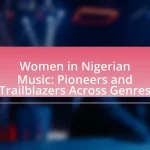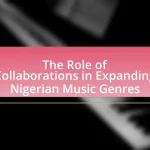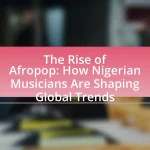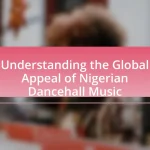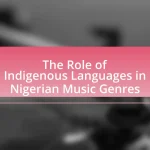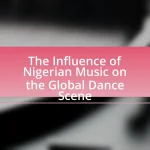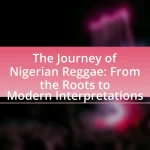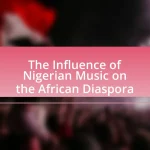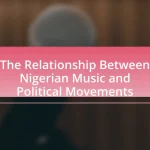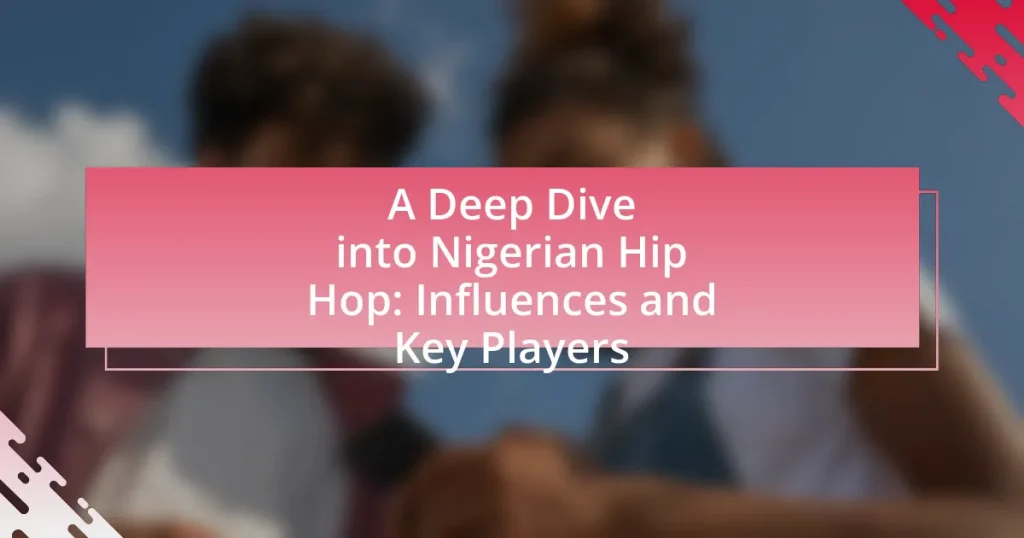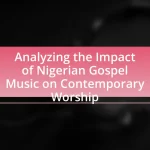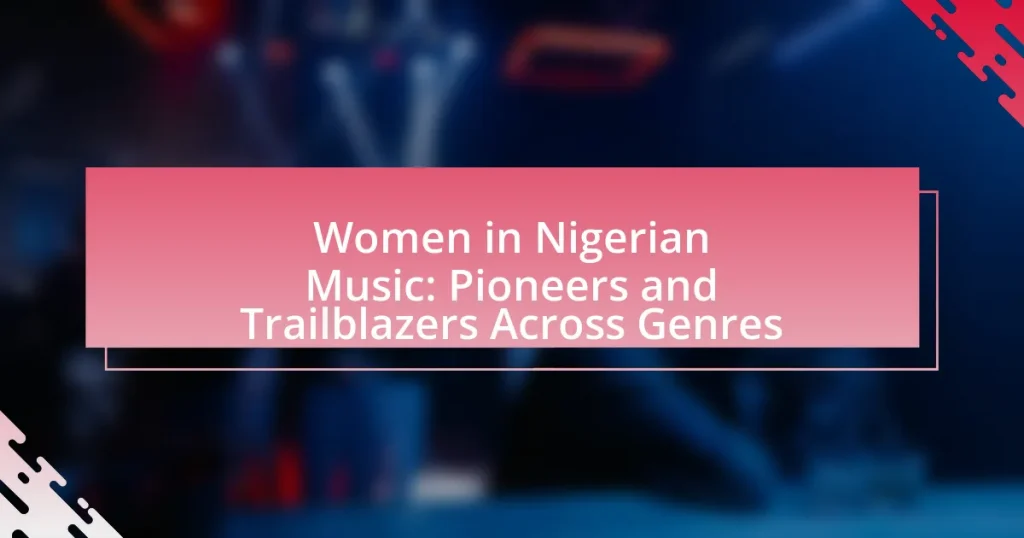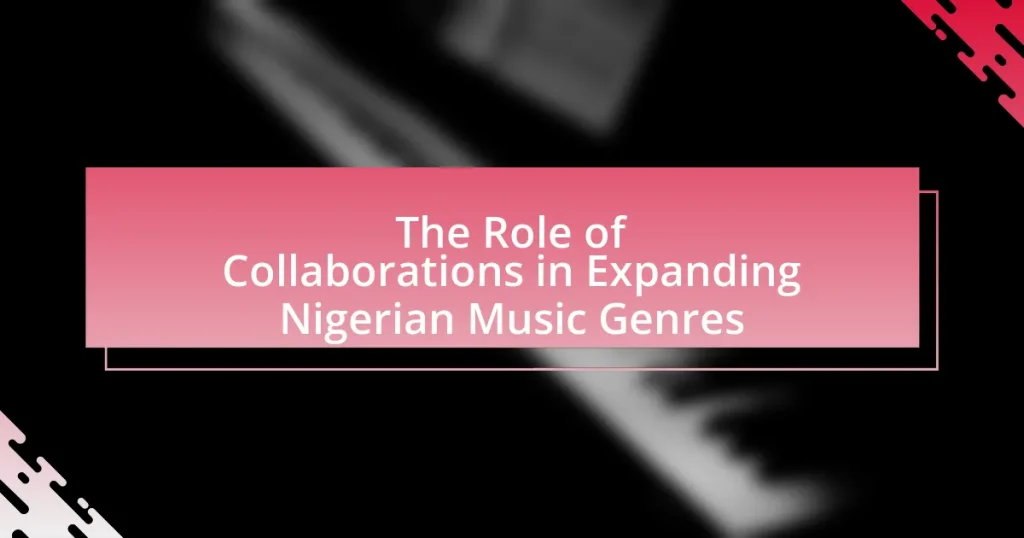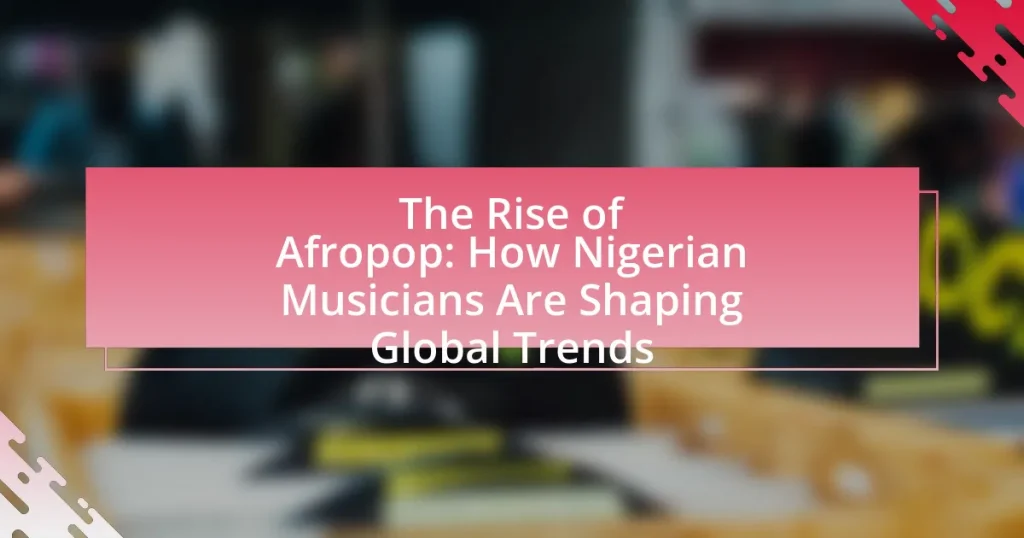Nigerian Hip Hop is a genre that emerged in the late 1990s, blending traditional African sounds with contemporary hip hop elements, and has evolved to reflect Nigeria’s rich cultural heritage. The article explores the origins of Nigerian Hip Hop, highlighting key pioneers such as Modenine and Eedris Abdulkareem, and discusses the defining characteristics of the genre, including its unique storytelling and incorporation of local languages. It also examines the influence of socio-political themes in lyrics, the role of producers and DJs, and the impact of globalization and technology on the genre’s evolution. Key players like Olamide, Wizkid, and M.I Abaga are identified for their contributions to the genre’s growth and international recognition, while emerging trends indicate a continued fusion of styles and a focus on social issues.
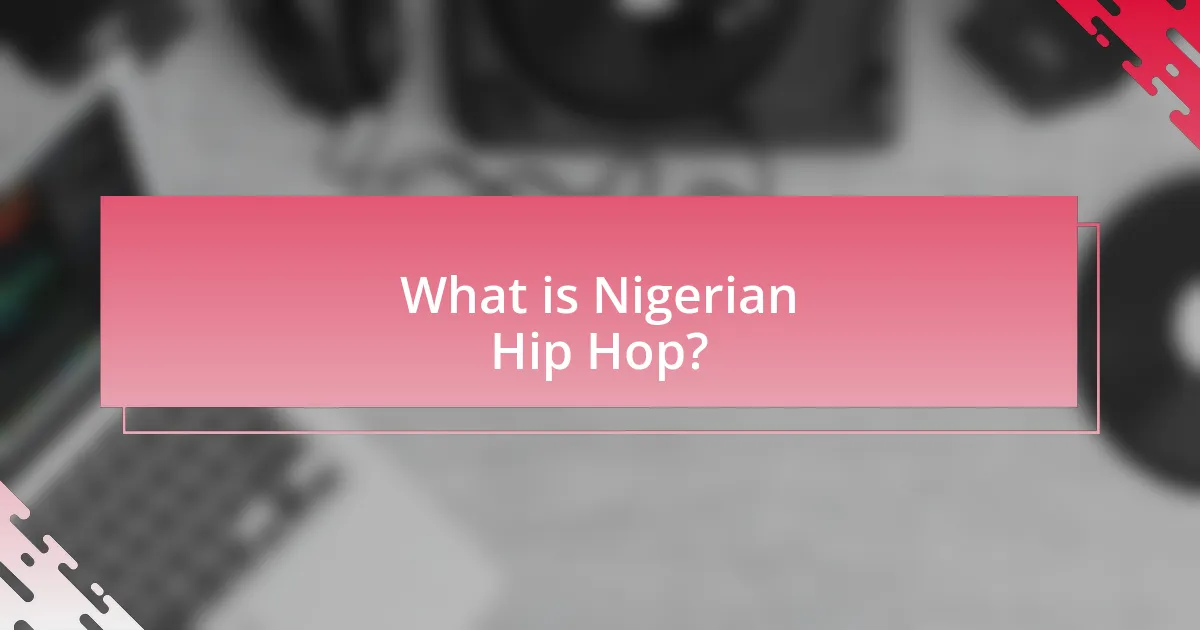
What is Nigerian Hip Hop?
Nigerian Hip Hop is a genre of music that blends traditional African sounds with contemporary hip hop elements, originating in Nigeria during the late 1990s. This genre has evolved to incorporate local languages, cultural themes, and diverse musical influences, reflecting the country’s rich cultural heritage. Notable artists such as Naeto C, M.I Abaga, and Olamide have played significant roles in popularizing Nigerian Hip Hop, contributing to its growth and global recognition. The genre has also been characterized by its unique storytelling, addressing social issues, personal experiences, and cultural identity, which resonates with a wide audience both locally and internationally.
How did Nigerian Hip Hop originate?
Nigerian Hip Hop originated in the late 1980s and early 1990s, influenced by American hip hop culture and local musical traditions. The genre began to take shape as Nigerian artists started incorporating rap into their music, blending it with indigenous sounds and languages. Pioneering acts like the group “The Remedies” and artists such as “Eedris Abdulkareem” played significant roles in popularizing hip hop in Nigeria, leading to the establishment of a vibrant music scene that reflects both global influences and local identity.
What cultural influences shaped the beginnings of Nigerian Hip Hop?
The beginnings of Nigerian Hip Hop were shaped by a blend of indigenous musical traditions, American hip hop culture, and socio-political themes. Indigenous influences include traditional Nigerian music styles such as Afrobeat and highlife, which incorporated local rhythms and instruments. The introduction of American hip hop in the 1980s and 1990s, particularly through media and cultural exchanges, brought new styles, language, and themes that resonated with Nigerian youth. Additionally, socio-political issues, including corruption and social injustice, became prevalent themes in the lyrics, reflecting the realities of Nigerian society. This fusion of local and global influences laid the foundation for the unique sound and identity of Nigerian Hip Hop.
Who were the pioneers of Nigerian Hip Hop?
The pioneers of Nigerian Hip Hop include artists such as Modenine, who is often regarded as one of the first prominent figures in the genre, and the group Plantashun Boiz, which played a significant role in popularizing hip hop in Nigeria during the early 2000s. Additionally, artists like Eedris Abdulkareem and 2Baba (formerly known as 2Face Idibia) contributed to the establishment and growth of the hip hop scene in Nigeria. Their work laid the foundation for the genre’s evolution and mainstream acceptance in the country.
What are the defining characteristics of Nigerian Hip Hop?
Nigerian Hip Hop is characterized by its fusion of indigenous sounds, local languages, and contemporary Western influences. This genre often incorporates Afrobeat rhythms, highlife melodies, and traditional Nigerian instruments, creating a unique sound that resonates with local culture. Additionally, Nigerian Hip Hop artists frequently use Pidgin English and various ethnic languages in their lyrics, making the music relatable to a diverse audience. The lyrical content often addresses social issues, personal experiences, and cultural pride, reflecting the realities of Nigerian life. The genre has gained international recognition, with artists like Wizkid and Olamide achieving global success, further solidifying its impact on the global music scene.
How does Nigerian Hip Hop differ from other hip hop genres?
Nigerian Hip Hop differs from other hip hop genres primarily through its unique blend of indigenous languages, cultural themes, and musical styles. While traditional hip hop often emphasizes English lyrics and Western cultural references, Nigerian Hip Hop incorporates local dialects such as Yoruba, Igbo, and Hausa, making it more relatable to its audience. Additionally, it often integrates Afrobeat, highlife, and traditional rhythms, creating a distinct sound that sets it apart from American or other global hip hop styles. This fusion not only reflects Nigeria’s rich cultural heritage but also addresses local social issues, resonating deeply with the Nigerian populace.
What themes are commonly explored in Nigerian Hip Hop lyrics?
Nigerian Hip Hop lyrics commonly explore themes of social issues, personal struggles, cultural identity, and political commentary. Social issues often include poverty, corruption, and inequality, reflecting the realities faced by many Nigerians. Personal struggles are frequently depicted through narratives of ambition, resilience, and the pursuit of success, showcasing the artists’ journeys. Cultural identity is emphasized through the use of indigenous languages and references to Nigerian traditions, while political commentary addresses governance, activism, and societal change, often critiquing the status quo. These themes resonate with audiences, making Nigerian Hip Hop a powerful medium for expression and reflection on contemporary life in Nigeria.
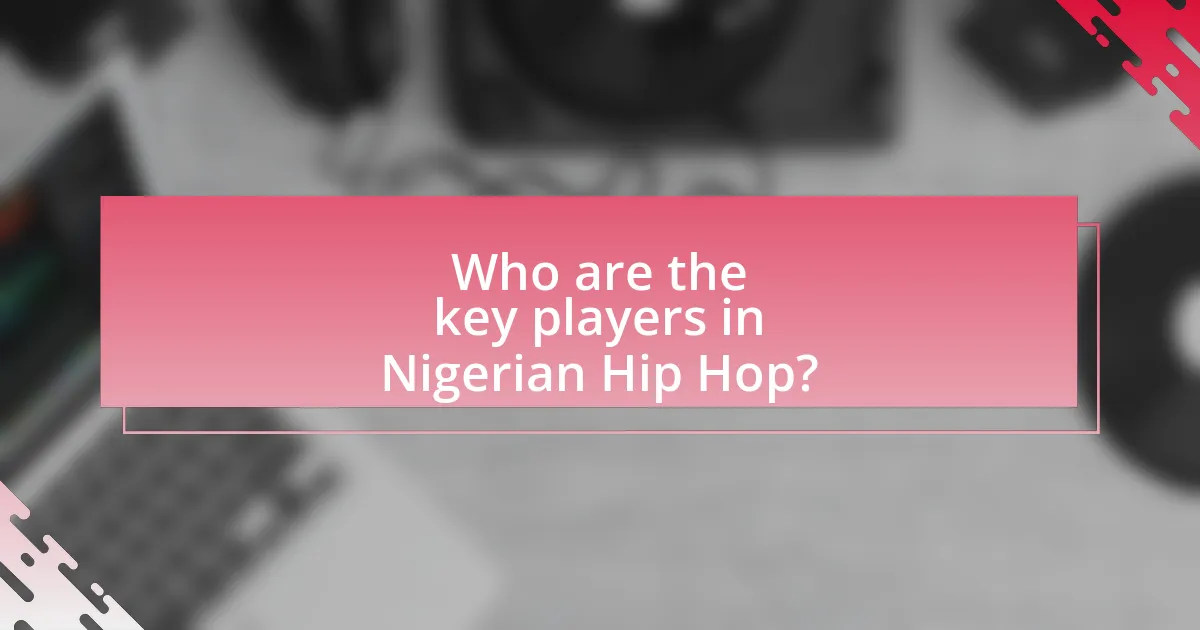
Who are the key players in Nigerian Hip Hop?
The key players in Nigerian Hip Hop include artists such as Olamide, Wizkid, Davido, and M.I Abaga. Olamide is known for his significant influence on the genre, particularly with his Yoruba lyrics and street style. Wizkid has gained international acclaim, contributing to the global recognition of Afrobeats. Davido is recognized for his catchy hooks and collaborations, while M.I Abaga is celebrated for his lyrical prowess and contributions to the evolution of Nigerian rap. These artists have shaped the landscape of Nigerian Hip Hop through their unique styles and widespread popularity.
Which artists have made significant contributions to the genre?
Artists such as Fela Kuti, Naeto C, and Olamide have made significant contributions to Nigerian hip hop. Fela Kuti is known for pioneering Afrobeat, which heavily influenced the genre’s development in Nigeria. Naeto C, recognized for his unique blend of hip hop and indigenous sounds, helped popularize the genre in the early 2000s with hits like “Kini Big Deal.” Olamide has played a crucial role in shaping contemporary Nigerian hip hop, particularly through his use of Yoruba language and street slang, making the genre more accessible and relatable to the youth. These artists have not only shaped the sound of Nigerian hip hop but have also contributed to its cultural relevance and global recognition.
What impact did artists like Naeto C and M.I Abaga have on Nigerian Hip Hop?
Naeto C and M.I Abaga significantly shaped Nigerian Hip Hop by introducing a unique blend of local dialects, contemporary themes, and innovative production techniques. Naeto C popularized the use of Nigerian Pidgin and indigenous languages in his lyrics, making the genre more relatable to the youth, while M.I Abaga’s storytelling and lyrical depth elevated the narrative quality of Nigerian rap. Their contributions helped to establish a distinct Nigerian sound that resonated with audiences, leading to increased mainstream acceptance and commercial success for the genre. For instance, M.I’s album “Talk About It” received critical acclaim and showcased the potential of Nigerian Hip Hop on an international scale, while Naeto C’s hit “Kini Big Deal” became an anthem that further solidified the genre’s place in popular culture.
How have emerging artists influenced the current landscape of Nigerian Hip Hop?
Emerging artists have significantly influenced the current landscape of Nigerian Hip Hop by introducing diverse sounds and innovative lyrical themes that resonate with younger audiences. These artists often blend traditional Nigerian music elements with contemporary genres, creating a unique fusion that reflects the cultural diversity of Nigeria. For instance, artists like Olamide and Fireboy DML have popularized Afrobeat-infused hip hop, which has garnered international attention and expanded the genre’s reach beyond Nigeria. Additionally, the rise of social media platforms has enabled these artists to connect directly with fans, facilitating a grassroots movement that challenges established norms and promotes authenticity in their music. This shift has led to a more inclusive and dynamic hip hop scene, where emerging voices can thrive and influence mainstream trends.
What roles do producers and DJs play in Nigerian Hip Hop?
Producers and DJs play crucial roles in Nigerian Hip Hop by shaping the sound and facilitating performances. Producers are responsible for creating beats, arranging music, and enhancing the overall production quality, which is essential for the genre’s appeal. For instance, notable producers like Don Jazzy and Sarz have significantly influenced the sound of Nigerian Hip Hop through their innovative production techniques. DJs, on the other hand, are vital for live performances and events, as they mix tracks, maintain the energy of the crowd, and introduce new music to audiences. Their skills in blending different songs and genres contribute to the vibrant atmosphere of Nigerian Hip Hop shows. Together, producers and DJs are integral to the genre’s evolution and popularity in Nigeria.
How do producers shape the sound of Nigerian Hip Hop?
Producers shape the sound of Nigerian Hip Hop by crafting unique beats and integrating diverse musical influences. They utilize a blend of traditional African rhythms, contemporary genres like Afrobeat and dancehall, and global hip-hop elements to create distinctive soundscapes. For instance, producers such as Don Jazzy and Sarz have been pivotal in popularizing the genre by incorporating local instrumentation and innovative production techniques, which resonate with both local and international audiences. This fusion not only enhances the authenticity of Nigerian Hip Hop but also contributes to its global appeal, as evidenced by the rising popularity of artists like Olamide and Wizkid, who have achieved international recognition through the distinctive sounds crafted by their producers.
What is the significance of DJing in the Nigerian Hip Hop scene?
DJing is significant in the Nigerian Hip Hop scene as it serves as a crucial element for music production, live performances, and cultural expression. DJs in Nigeria not only curate and mix tracks but also play a vital role in popularizing local artists and genres, thereby shaping the soundscape of the hip hop community. For instance, influential DJs like DJ Jimmy Jatt have been instrumental in launching the careers of numerous Nigerian hip hop artists by providing platforms for exposure through mixtapes and radio shows. This practice has contributed to the growth of the genre, making DJing an essential component of the Nigerian hip hop ecosystem.
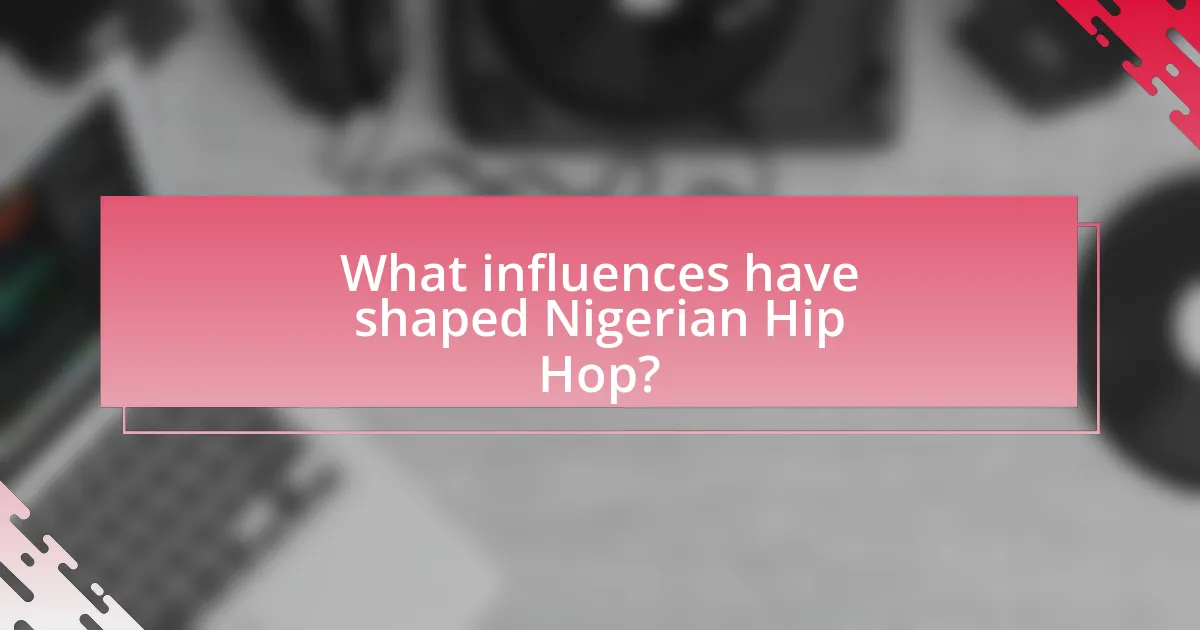
What influences have shaped Nigerian Hip Hop?
Nigerian Hip Hop has been shaped by a combination of cultural, social, and musical influences. The genre draws heavily from traditional African music, particularly highlife and juju, which incorporate local rhythms and instruments. Additionally, the global impact of American hip hop, especially from the 1990s onward, introduced elements such as rap techniques and production styles, leading to a fusion that characterizes Nigerian Hip Hop today. The socio-political landscape of Nigeria, including issues like corruption and social justice, has also influenced lyrical themes, making the genre a platform for commentary and expression. Furthermore, the rise of digital technology and social media has facilitated the dissemination of Nigerian Hip Hop, allowing artists to reach wider audiences and collaborate across borders, thus enriching the genre’s diversity and appeal.
How has globalization impacted Nigerian Hip Hop?
Globalization has significantly influenced Nigerian Hip Hop by facilitating the exchange of cultural elements and expanding its reach beyond local boundaries. This genre has incorporated diverse musical styles, such as American rap and Afrobeat, leading to a unique fusion that resonates with both local and international audiences. The rise of digital platforms, such as social media and streaming services, has allowed Nigerian artists to showcase their work globally, resulting in collaborations with international musicians and increased visibility. For instance, artists like Wizkid and Burna Boy have gained international acclaim, reflecting the genre’s growing global footprint.
What international artists have influenced Nigerian Hip Hop artists?
International artists such as Jay-Z, 2Pac, Nas, and Kanye West have significantly influenced Nigerian Hip Hop artists. Jay-Z’s lyrical prowess and business acumen have inspired many Nigerian rappers to elevate their craft and approach to the music industry. 2Pac’s storytelling and social commentary resonate deeply with Nigerian artists, who often address similar societal issues in their music. Nas’s intricate wordplay and focus on authenticity have also left a mark, encouraging Nigerian rappers to prioritize lyrical depth. Additionally, Kanye West’s innovative production techniques and genre-blending styles have motivated Nigerian artists to experiment with their sound, leading to a more diverse hip hop scene in Nigeria.
How do social and political issues in Nigeria reflect in Hip Hop music?
Social and political issues in Nigeria are prominently reflected in Hip Hop music through lyrics that address corruption, poverty, and social injustice. Nigerian Hip Hop artists often use their platform to critique government policies and highlight the struggles faced by the youth, such as unemployment and lack of access to education. For instance, artists like Olamide and Falz have released songs that explicitly call out political corruption and advocate for social change, resonating with the frustrations of their audience. This connection between Hip Hop and societal issues is further evidenced by the genre’s role in movements like #EndSARS, where musicians used their influence to mobilize protests against police brutality and demand accountability from the government.
What role does technology play in the evolution of Nigerian Hip Hop?
Technology plays a crucial role in the evolution of Nigerian Hip Hop by facilitating music production, distribution, and promotion. The advent of digital audio workstations and software has enabled artists to produce high-quality music from home studios, significantly lowering production costs. Additionally, platforms like YouTube, SoundCloud, and social media have transformed how artists share their work, allowing for wider reach and audience engagement. For instance, the rise of mobile internet access in Nigeria has led to a surge in streaming and downloading of hip hop tracks, with reports indicating that over 50% of Nigerian youth consume music primarily through their smartphones. This technological shift has not only democratized access to music but also fostered a vibrant online community that supports emerging artists.
How has social media changed the way Nigerian Hip Hop is consumed?
Social media has significantly transformed the consumption of Nigerian Hip Hop by enabling direct artist-to-fan interactions and facilitating the rapid dissemination of music. Platforms like Instagram, Twitter, and TikTok allow artists to share their work instantly, reaching a wider audience without traditional media gatekeepers. For instance, Nigerian artists such as Olamide and Wizkid have utilized social media to promote their music, leading to viral trends and increased streaming numbers. Additionally, the accessibility of platforms allows fans to engage with content, share their opinions, and participate in discussions, further enhancing the community around Nigerian Hip Hop. This shift has resulted in a more dynamic and interactive music culture, where audience feedback can influence an artist’s direction and success.
What platforms are most popular for promoting Nigerian Hip Hop artists?
The most popular platforms for promoting Nigerian Hip Hop artists are social media networks, particularly Instagram, Twitter, and TikTok, along with music streaming services like Spotify and Apple Music. These platforms enable artists to reach a wide audience, engage with fans, and share their music effectively. For instance, Instagram and TikTok are particularly influential in creating viral trends and challenges that can significantly boost an artist’s visibility and popularity. Additionally, Spotify and Apple Music provide artists with analytics and promotional tools that help in targeting specific demographics, enhancing their reach in the competitive music landscape.
What are the future trends in Nigerian Hip Hop?
Future trends in Nigerian Hip Hop include increased fusion with Afrobeat and global genres, a rise in digital distribution, and a focus on social issues. The blending of styles is evident as artists like Burna Boy and Olamide incorporate Hip Hop elements into Afrobeat, appealing to a broader audience. Digital platforms such as Spotify and Apple Music are becoming primary channels for music consumption, allowing artists to reach international markets more easily. Additionally, there is a growing emphasis on addressing social and political themes in lyrics, reflecting the youth’s desire for change and representation in society. This trend is supported by the success of tracks that tackle issues like corruption and inequality, resonating with listeners both locally and globally.
How is the genre expected to evolve in the coming years?
Nigerian hip hop is expected to evolve by increasingly incorporating diverse musical influences and expanding its global reach. As artists experiment with genres such as Afrobeats, trap, and R&B, the fusion of these styles is likely to create innovative sounds that resonate with both local and international audiences. Additionally, the rise of digital platforms and social media will facilitate greater collaboration among artists, leading to a more interconnected music scene. This evolution is supported by the growing popularity of Nigerian artists on global charts, with tracks like Burna Boy’s “Last Last” and Wizkid’s collaborations gaining significant traction worldwide, indicating a trend towards broader acceptance and integration of Nigerian hip hop in the global music landscape.
What new sounds or styles are emerging within Nigerian Hip Hop?
New sounds and styles emerging within Nigerian Hip Hop include Afro-fusion, which blends traditional African rhythms with contemporary hip hop beats, and trap music, characterized by its use of hi-hats and heavy bass. Artists like Olamide and Nasty C are leading this evolution, incorporating local dialects and cultural references into their lyrics. The rise of digital platforms has also facilitated collaborations across genres, further diversifying the soundscape. This evolution reflects a growing global influence while maintaining a strong connection to Nigerian cultural roots.
